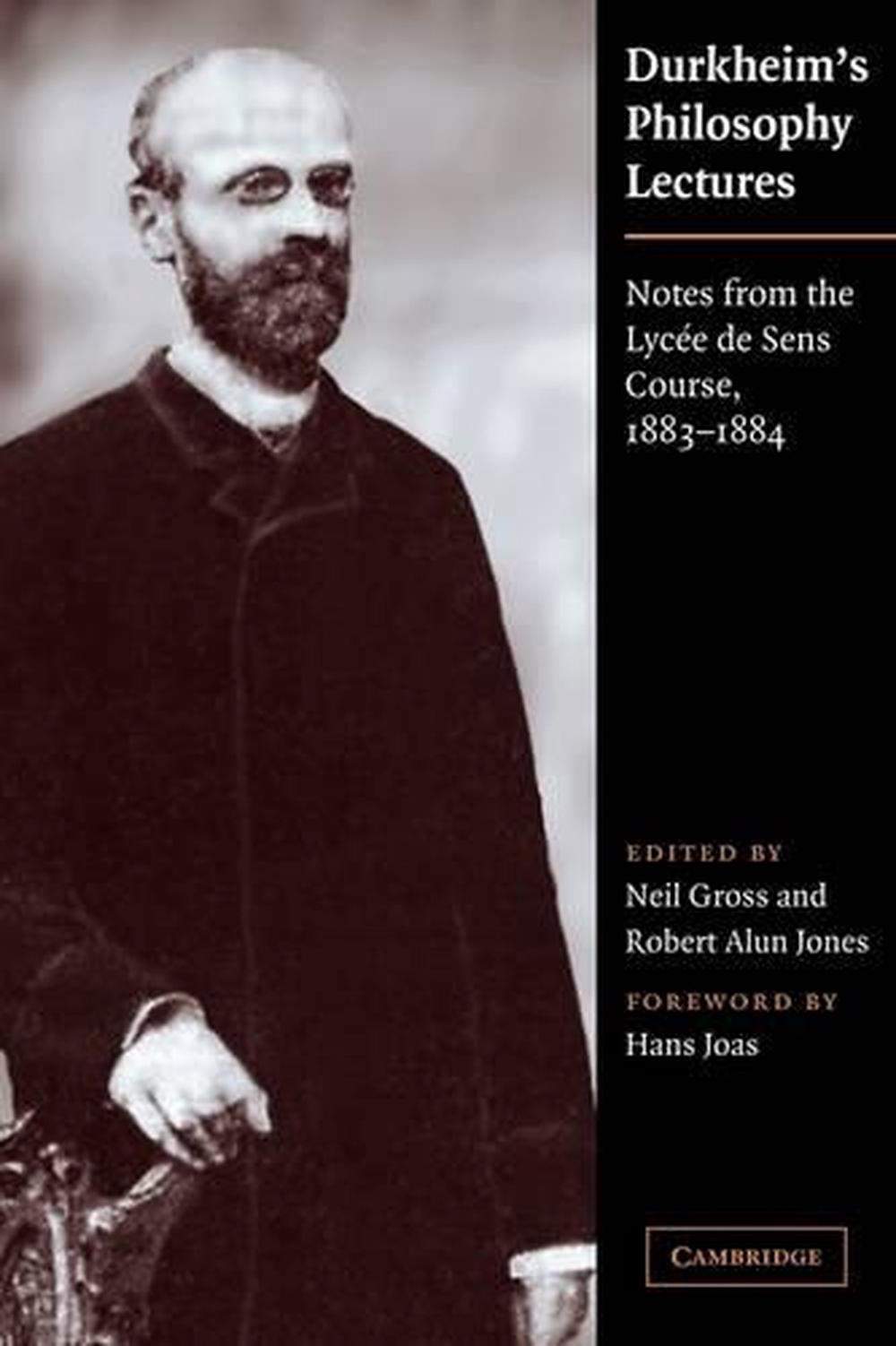
Durkheim's Philosophy Lectures
by Emile Durkheim, Neil Gross, Robert Alun Jones, Hans Joas
Moving back and forth between the history of philosophy and the contributions of philosophers in his own day, Durkheim takes up topics as diverse as philosophical psychology, logic, ethics, and metaphysics, and seeks to articulate a unified philosophical position.
Paperback
English
Brand New
Publisher Description
Moving back and forth between the history of philosophy and the contributions of philosophers in his own day, Durkheim takes up topics as diverse as philosophical psychology, logic, ethics, and metaphysics, and seeks to articulate a unified philosophical position. Remarkably, in these lectures, given more than a decade before the publication of his groundbreaking book, The Division of Labour in Society (1893), the 'social realism' that is so characteristic of his later work - where he insists, famously, that social facts cannot be reduced to psychological or economic ones, and that such facts constrain human action in important ways - is totally absent in these early lectures. For this reason, they will be of special interest to students of the history of the social sciences, for they shed important light on the course of Durkheim's intellectual development.
Author Biography
Emile Durkheim (1858-1917) founded the French school of sociology. In 1893 he created the "Annee Sociologique, " which he edited until 1913, and he wrote seminal texts including "The Division of Labor in Society, Suicide, " and "The Rules of Sociological Method."
Table of Contents
Foreword; Translator's note; Acknowledgements; Introduction; Part I. Preliminary Matters: 1. The object and method of philosophy; 2. The object and method of philosophy (conclusion); 3. Science and philosophy; 4. The divisions of philosophy; Part II. Psychology: 5. The object and method of psychology; 6. Faculties of the soul; 7. On pleasure and pain; 8. The inclinations; 9. The emotions and passions; 10. Theory of knowledge; 11. External perception and its conditions. The senses; 12. External perception. The origin of the idea of externality; 13. External perception. On the objectivity of the idea of externality. (1) Does the external world exist?; 14. External perception. On the objectivity of the idea of externality. (2) On the nature of the external world; 15. Consciousness. On the conditions of consciousness; 16. Consciousness. On the origin of the idea of the self; 17. Consciousness. On the nature of the self; 18. Reason. The definition of reason; 19. Reason. The material of reason. (1) Principles; 20. Reason. The material of reason. (2) Rational or first ideas; 21. Reason. Empiricism; 22. Reason. Evolutionism. The theory of heredity; 23. Reason. On the objectivity of rational principles; 24. Faculties of conception. On the association of ideas; 25. Faculties of conception. Memory; 26. Faculties of conception. Imagination; 27. Faculties of conception. Sleep. Dreams. Madness; 28. Complex operations of the mind. Attention. Comparison. Abstraction; 29. Complex operations of the mind. Generalization. Judgment. Reasoning; 30. The object and method of aesthetics; 31. What is beauty; 32. Prettiness and the sublime. Art; 33. On activity in general. Instinct; 34. Habit; 35. On the will and on freedom; 36. On freedom (continued). Psychological determinism; 37. On freedom (conclusion). Scientific determinism. Theological fatalism. Part III. Logic: 38. Introduction. On logic; 39. On truth. On certainty; 40. On certainty (conclusion); 41. On false certainty of error; 42. Skepticism; 43. Ideas. Terms. Judgments. Propositions; 44. Definition; 45. On the syllogism; 46. On induction; 47. Fallacies; 48. On method; 49. Method in the mathematical sciences; 50. The methodology of the physical sciences; 51. Method in the natural sciences; 52. Method in the moral sciences; 53. Method in the historical sciences; 54. Language; Part IV. Ethics: 55. Definition and divisions of ethics; 56. On moral responsibility; 57. On moral law. The history of Utilitarianism; 58. Critique of Utilitarianism. The morality of sentiment; 59. The morality of Kant; 60. The moral law; 61. On duty and the good. On virtue. Rights; 62A. Division of practical ethics; 62B. Individual morality; 63. Domestic ethics; 64. Civic ethics; 65. General duties of social life; 66. General duties of social life. (1) The duty of justice; 67. General duties of social life. (2) Charity; 68. Summary of ethics; Part V. Metaphysics: 69. Metaphysics. Preliminary considerations; 70. On the soul and its existence; 71. On the spirituality of the soul (conclusion). On materialism; 72. The relationship between the soul and the body; 73. On the immortality of the soul; 74. On God. Metaphysical proofs of his existence; 75. Critique of metaphysical proofs of the existence of God; 76. Explanation and critique of the physiotheological proof; 77. Critique of the physiotheological proof (conclusion). Moral proofs and the existence of God; 78. The nature and attributes of God; 79. The relationship between God and the world. Dualism, pantheism, and creation; 80. The relationship between God and the world (conclusion). Providence, evil, optimism, and pessimism; Appendix: biographical glossary; Index.
Promotional
Emile Durkheim sets out to introduce students to the field of philosophy.
Promotional "Headline"
Emile Durkheim sets out to introduce students to the field of philosophy.
Description for Bookstore
Moving back and forth between the history of philosophy and the contributions of philosophers in his own day, Durkheim takes up topics as diverse as philosophical psychology, logic, ethics, and metaphysics, and seeks to articulate a unified philosophical position.
Description for Library
Moving back and forth between the history of philosophy and the contributions of philosophers in his own day, Durkheim takes up topics as diverse as philosophical psychology, logic, ethics, and metaphysics, and seeks to articulate a unified philosophical position.
Details

